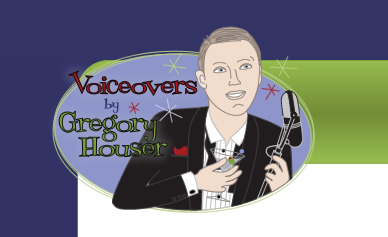I'm running around a lot as of late (more so than usual). Nearing the end stretch of another degree program, voice over work, house hunting, and all of the things in life which whittle away at your free time. Ironically, given all of the additional things, I'm getting unsolicited VO work through my website.
I have no complaints with that =-)
With the work that I've been landing there's been an interesting trend I've been noticing and I think it's worth mentioning since for some, it's been costing you bookings. I think that the best way is to describe a last-minute booking I got a few weeks back. It was Memorial Day, and I got a last minute booking from a new client who wanted me to do a voice over for a video game (my first actually, w00t!). I don't know the specifics or how many people were contacted before the client and the studio they were working with came up with my name. It doesn't matter, but I know that I wasn't the first person they'd tried to contact (the director knew me more from industrials and commercial voice over than from video games and character voice over).
So how did I end up with the booking? The answer is simple. The client needed a voice, they needed it quickly, and they wanted an actor who wasn't originally part of the project. These are all good things, but the problem was that when the client and the recording studio wanted a voice talent who had either ISDN or a phone patch (and also had FTP capabilities so they could get the finished product quickly). Basically, they realized that the odds of getting someone in the studio on a national holiday were slim to none, but they wanted to be able to direct the performance. Having an ISDN or phone patch allowed them to do this, and to also have playback capabilities (if necessary) . I don't know about anyone else, but these seem like reasonable things to ask for from your talent.
I don't want to get into a discussion over the loss of fidelity relating to the bit-rate of audio playback over an analog phone line with a digital hybrid phone patch... for the audiophiles amongst us, we can argue the merits of this at another time.So down the list they go. Folks with the experience they're looking for, and have listed themselves as having ISDN or a phone patch... shouldn't be too hard, right? So how did they end up with me? The short answer from the engineer on the other end of the line was this: none of the talent they had listed with the pre-reqs the client needed actually had the capabilities they claimed to have. They overstated their capabilities. Eventually, the engineer realized that there was one person they knew who had the stuff needed to do the job. They'd done sessions with this person before, and knew they knew how to operate it (and more importantly, that they actually owned the gear). That person is me...
I now have a very happy client who is already talking about future work they want me to take on (feel free, it was a pleasure working with you =-)
I think that this happens a lot more with voice talent than people realize. What the folks who do this don't realize is that if you're found out, the client/studio who realizes it isn't just going to keep it to themselves. Voice over is one of the most competitive types of acting, but we're also very close-knit (and not surprisingly, the folks in the industry like to talk amongst themselves). I know that in my home market of Philadelphia, if you're found to be overstating your mic cabinet, or home studio capabilities, then you're not too long for this line of work. It's not much different than if you have a bad attitude in the studio... word gets around, and it travels quickly.
I know that we all want to get booked, and to do so regularly. However, there's a line that gets crossed when you start using misrepresentation to promote your business. In the world of security there's an axiom which sums it all up. "If you're deceptive about the little things, then how can I trust you with the important stuff? If I caught you lying about one thing, how many more lies do I have yet to discover?" Trust is given, but must be verified and earned. If you lose that, then you've lost everything. The point is this - if you misrepresent yourself and you get found out (which there's a good chance of happening), your clients and those who work with you are going to start asking themselves just what else you've been deceptive about. Nobody wants to be in that position.
Without turning this into an even longer discussion on morality, you need to maintain truth in your advertising. I've lost count of the U47-owning VO actors out there who thought nobody would notice that they've got a $100 preamp with a $70 mic. I'm not saying that you can't sound good with less expensive gear. You can, and there are more than a few folks in the industry who do (once again, it's not just about the gear). However, you can't be claiming to have one thing and in reality have something else...
At best, it's deceptive advertising of your services. Frankly though, it's downright fraud, and people in the industry are all too willing to let everyone know about it once someone gets caught.
Of all the dumb things one can do to harm their voice over careers, this is one of the top on my list. The worst part about it is that the person you've cheated most is yourself (if you're good enough to book, then the tools you used to get the booking didn't matter to the person who hired you).
Labels: business, fraud, voiceover










